Every Mason must avoid living with the morality of Tartuffe
Article translated from the original Spanish
The history of humanity has been characterized by the exploitation of man by man. Wars, torture, genocides, and an endless list of miserable deeds carried out by homo sapiens, which reveals that rational capacity does not make intelligence.
Human life is itself trial and error, however, there are errors and horrors, and that is the remarkable difference between the actions of the profane and the actions of the Mason.
In this world of horrors – more than errors – product of ignorance in which it seeks to maintain the human being with very sinister purposes and interests, there is the initiate in the Masonic light, who works in the knowledge of himself seeking, to ‘wake up’, to get to see the reality of the world beyond the phenomena that impress the senses and deliver a false image of reality as notably illustrated in the myth of Plato’s Cave: ‘the shadows are the reality of the prisoners but they are not accurate representations of the real world’.
To awaken is to come to understand that, as Thomas Hobbes points out, human beings are evil by nature, since ‘man is a wolf to man’ [Homo homini lupus], and human nature is characterized by a cruel and universal selfishness for power in any of its manifestations: fame, wealth, knowledge, love, prestige, etc., which are nothing more than expressions of the power that man yearns for.

Thomas Hobbes, British philosopher (1588-1679) – Credit: Thomas Hobbes. Line engraving by W. Humphrys, 1839
IMAGE LINKED: wellcome collection Attribution 4.0 International (CC BY 4.0)
Power is amoral, it is the human being who makes it immoral.
It is in this immorality for the power struggle – which has caused so much damage throughout human history – that the Mason must avoid falling prisoner in the dream state to which Tartuffe’s morality leads, since a Mason can be active in the lodge, and being in turn much more asleep than a brother who is in a dream, since the ‘waking state’ will depend on the level of consciousness reached.
There should be no Tartuffes in Freemasonry, for the good of the Order and Humanity.
The French playwright and poet Jean-Baptiste Poquelin, better known as Moliére, concluded his work Tartuffe ou l’Imposteur in 1664, in which he denounced religious hypocrisy, in force to this day, and aggravated by a guild of paedophiles, and paedophiles protected by the Holy See.
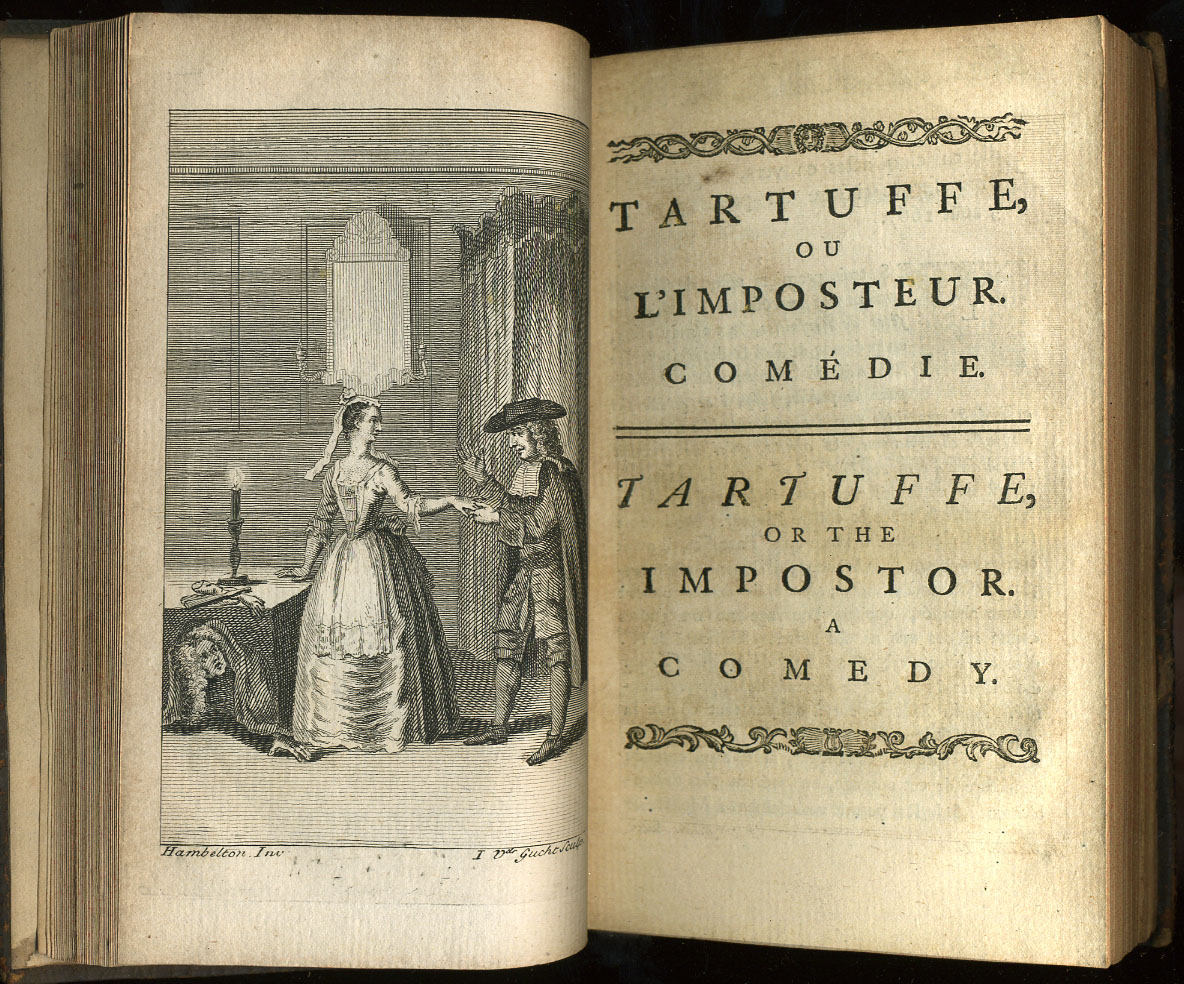
Frontispiece and titlepage of Tartuffe or The Imposter from a 1739 collected edition of his works in French and English, printed by John Watts. By Moliere &; John Watts – Private Collection of S. Whitehead, Public Domain
IMAGE LINKED: wellcome collection Attribution 4.0 International (CC BY 4.0)
Tartuffe is the name given to the truffle; a fungus hidden under the ground.
Now, the Mason who lives as a Tartuffe – that fungus that is neither animal nor vegetable – lives without being a profane and lives without being a Mason, that is, he becomes a miserable being without a world to belong to, a being without light and without darkness.
The Mason Tartuffe is the one who degenerates the VITRIOL in the bowels of the earth, since he ignores the value and meaning of rectifying the Raw Stone.
So, symbolically, Tartuffe, or the impostor (Le Tartuffe ou l’Imposteur), is the false Mason; that impostor who has sought to initiate himself in the august Masonic Order and regularly attends the lodge motivated by some, or perhaps all, of these three reasons:
- for the pleasure of the fork and knife: he attends the lodge only because of his desire to eat, drink and talk.
- by careerism: attends the lodge looking for contacts and status to access a higher class.
- by mercenary instinct: attend the lodge seeking financial and material benefits.
The Mason who makes a Tartuffe out of his Masonic initiation and life does not live in an error but in a horror, the horror of not having understood anything about the true meaning of Masonic initiation.
It is not necessary to reach the degree of Master Mason or the 33rd degree of the Ancient and Accepted Scottish Rite to become an awakened human being, awakening is a level of consciousness and not holding a certain level or degree in the Masonic career, for it is entirely true that there are laymen awake – laymen with aprons – and regular Masons in darkness – Tartuffen Masons.
Every Mason must know and recognize his history and his mistakes so that they do not turn into horrors.
Accept your mistakes in the light of the truth because, although cold as a dagger, it is better to live in the truth or in the search for it, than to live in ignorance.
The truth teaches us that like all human work Freemasonry is imperfect, it makes mistakes and sometimes horrors inspired by Tartuffe, which must be known to learn from them.
Here is one of them:
Chilean Freemasonry, particularly the Grand Lodge of Chile, had as Grand Master of the Grand Lodge of Chile during the years 1998-2002/2002-2006, Professor Jorge Carvajal Muñoz, who had a Masonic life of 47 years, reached the 33rd Degree and last of the R: .E: .A: .A: .
Years of Masonic life, and having reached the highest degrees in the Order, were not enough to rectify the raw stone, leading him to commit horrors, eagerly of power – which earned him expulsion from Freemasonry in 2008.
It is not a fact to be glad but to regret. From mistakes you learn, from horrors you suffer.
Learning from mistakes and suffering from horrors should serve to remove from the lodges any sign of Tartuffe, since in this lies the prestige, future and destiny of Freemasonry.
The Q: .H:. José Ingenieros, in his work The Mediocre Man, in Chapter III. Point I, tells us about ‘The Moral of Tartuffe’, words that every good Mason should engrave on his internal work plate to be a light in his lodge and an example worthy of imitation in profane society, without for that reason he should give to meet the profane world his status as a Freemason.

Here are the words of the Q: .H :. José Ingenieros:
Hypocrisy is the art of muzzling dignity; she makes the scruples in men who are unable to resist the temptation of evil to silence.
It is lack of virtue to renounce it and of courage to assume its responsibility. It is the guano that fertilizes vulgar temperaments, allowing them to prosper in lies; like those trees whose branches are more leafy when they grow near the swamps.
Ice, where she passes, all noble germ of ideal: zarzagán of enthusiasm. Men humbled by hypocrisy live without reverie, hiding their intentions, masking their feelings, jumping like the skink; they have the intimate, though unconfessed, certainty that their actions are unworthy, shameful, harmful, misled, irredeemable. That is why its morality is insolvent: it always implies a simulation.
No faith drives hypocrites; they do not suspect the value of rectilinear beliefs. They shirk responsibility for their actions, are bold in betrayal and timid in loyalty.
They conspire and attack in the shadows, hide ambiguous words, praise with poisonous reluctance, and slander with plush softness. They never wear an unmistakable award: they close all the cracks of their spirit where their personality could show naked, without the social garb of lies.
In their desire they simulate the skills and qualities they consider advantageous to increase the shadow they cast on their stage.
Just as meagre ingenuities mimic intellectual talent, embalming themselves with refined devices and defences, subjects of indecisive morality parody moral talent, gold stripping their insipid honesty of virtue.
They ignore the verdict of the inner court itself; They pursue the safe-conduct granted by the accomplices of their conventional prejudices.
The hypocrite usually takes advantage of his feigned virtue, much more than the: true virtuoso. Respected men swarm in force of not being discovered under disguise; It would be enough to penetrate the intimacy of his feelings, a single minute, to notice his fold and turn his estimation into contempt.

José Ingenieros, Argentine physicist and philosopher (1877-1925) – Archivo Grafico de la Nación, Public Domain
IMAGE LINKED: wellcome collection Attribution 4.0 International (CC BY 4.0)
The enlightening mind of the Q: H:. José Ingenieros teaches us how to know and recognize a Tartuffe, since the Tartuffe’s main weakness is its lust for power.
Mason and power are unavoidable issues, as power is unavoidable as an inescapable aspect of communication, then, the Mason must use power, and particularly the power of knowledge, to build a more just and fraternal society, to educate and teach to think to the one who lives conditioned by ignorance. It must be light in a world of ignorance, pain and hypocrisy.
The Mason who uses his knowledge, the power of knowledge about the world and its reality, to instrumentalize and use another human being, becomes a Tartuffe, an indecent and unscrupulous being, worthy of being called a hypocrite with an apron.
In short, what is being a Mason? –
‘To be a Mason is not to be a Tartuffe.’
Article by: Carlos Francisco Ortiz

Carlos was initiated in 2015 in Equality Lodge No. 88. Joined Fraternal Action Lodge No. 42 in 2018. (under the regular Grand Lodge of Chile)
During his university life, and before receiving Masonic light, he participated in the reorganization and foundation of Clans of the Youth Fraternity. Alpha Pi Epsilon.

Hombre Mediocre/ Mediocre Man (Spanish Edition)
By: Jose Ingenieros
Jose Ingenieros nacio en Buenos Aires en 1877 y murio en la misma ciudad en 1925.
Medico, catedratico, cultivador de los estudios psiquiatricos, filosofico y sociologicos, desarrollo una actividad multiple y fructuosa en todos esos dominios. Sus obras alcanzaron vasta resonancia e influjo en todo el continente americano.
Filosoficamente, Ingenieros fue la cabeza mas visible y prestigiosa del positivismo.
En El hombre mediocre, el autor se propuso una noble tarea: estigmatizar la rutina, la hipocresia, y el servilismo, esas funestas lacras morales que impiden la formacion de ideales y el ennoblecimiento de la vida.

Recent Articles: by Carlos Francisco Ortiz
 Universal Freemasonry, beyond its particular and different rites and rituals, is an esoteric school itself since there can be no Freemasonry without esotericism. |
 The difference between equity and equality? Equality means providing everyone with the same amount of resources regardless of their needs. Equity is when resources are shared based on each person needs. |
 Discover how the Grand Lodge of China escaped the power of communism. |
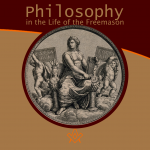 Philosophy in the Life of the Freemason Before the dark night of dogmatic thought, philosophy is the dawn of man, and the light for the Mason in his search for truth. |
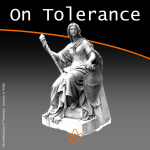 Tolerance is understood as respect for the ideas, beliefs, and practices of others when they are different or contrary to one's own. |
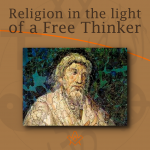 Religion in the light of a Free Thinker Every Mason is a sincere seeker of light, of all light that allows him to advance in his search for truth. |
 Life is shadow, death is light. We live in darkness and we die in the light - read on to learn more about 'a Mason's thought about death'. |
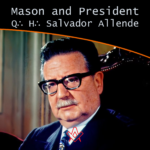 A Mason betrayed - the tragic story of President Salvador Allende. |
 The Mason and his Consciousness of Time Nobody can buy life, life is spent and the expense of life is time. As time goes by, life is spent. |
 Human life is itself trial and error, however, there are errors and horrors, and that is the remarkable difference between the actions of the profane and the actions of the Mason. |
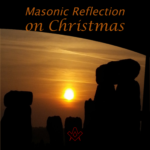 Masonic Reflection on Christmas What is the connection between Freemasonry, Christmas and pagan festivals? |
 Dear Brother - Q∴H∴ Jaime Galté Carré |
 Development of the Emulation Ritual Relevant historical background in the evolutionary development of the Emulation Ritual |
 What is Retejador? And why is it so important? |
 The Dream After the Initiation The dream, in a profane sense, is understood as a biological state or condition, as that which is an integral part of daily life |
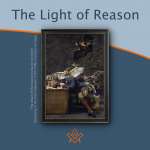 How does man think to himself and think of the universe |
masonic knowledge
to be a better citizen of the world
share the square with two brothers

click image to open email app on mobile device








